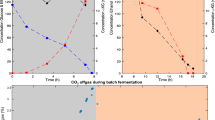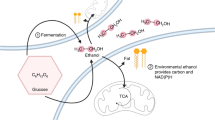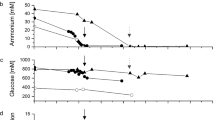Abstract
IT has been established by a number of authors that sulphate is the usual source of sulphur for many micro-organisms, and also for yeasts1. However, much remains to be elucidated about the details of sulphate uptake by the cell and its metabolism.
This is a preview of subscription content, access via your institution
Access options
Subscribe to this journal
Receive 51 print issues and online access
$199.00 per year
only $3.90 per issue
Buy this article
- Purchase on Springer Link
- Instant access to full article PDF
Prices may be subject to local taxes which are calculated during checkout
Similar content being viewed by others
References
Schulz, A. S., and McManus, D. K., Arch. Biochem., 25, 401 (1950).
Rautanen, N., Ann. Report Res. of the Plant Res. Inst. Univ. Pretoria (1955–56).
Cowie, D. B., Roberts, R. B., and Bolton, E. T., Science, 119, 579 (1954).
Hilz, H., and Kittler, M., Biochim. Biophys. Acta, 30, 650 (1958).
Robbins, P. W., and Lipmann, F., J. Biol. Chem., 229, 837 (1957).
Author information
Authors and Affiliations
Rights and permissions
About this article
Cite this article
KLEINZELLER, A., KOTYK, A. & KOVÁČ, L. Utilization of Inorganic Sulphate by Baker's Yeast. Nature 183, 1402–1403 (1959). https://doi.org/10.1038/1831402a0
Issue Date:
DOI: https://doi.org/10.1038/1831402a0
This article is cited by
-
Sulfite formation by wine yeasts
Archives of Microbiology (1977)
-
The influence of pH on sulphite formation by yeasts
Archives of Microbiology (1976)
-
The uptake of inorganic sulphate by a brewer’s yeast
Folia Microbiologica (1963)
-
Utilization of inorganic Sulphate labelled with Sulphur-35 by Torulopsis utilis
Nature (1962)
-
Uptake of inorganic sulphate by the yeast cell
Folia Microbiologica (1959)
Comments
By submitting a comment you agree to abide by our Terms and Community Guidelines. If you find something abusive or that does not comply with our terms or guidelines please flag it as inappropriate.



